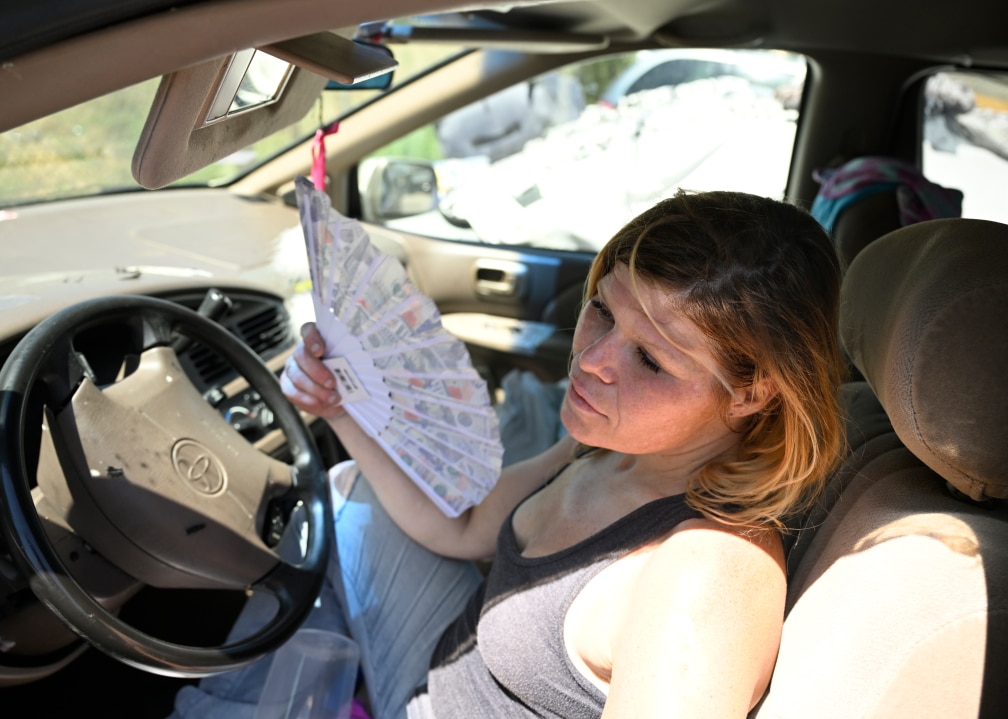
Xea Landers, 39, uses a fan to help cool down during dangerous heat on Aug. 11, 2022 in Denver. Landers said she is living in her van that is parked near the Salvation Army shelter in Denver. (RJ Sangosti/The Denver Post)
Last June, the city of Denver doubled down on a program that sets aside designated spots where individuals living out of their car can park overnight.
Less than a year later, it is pulling back the additional funding it had agreed to provide.
“What I was told was that the contract had been signed with the previous administration … and priorities have changed,” said Terrell Curtis.

Terrell Curtis
Curtis is the executive director of the Colorado Safe Parking Initiative, which manages overnight parking sites around the Denver metropolitan area. The nonprofit’s clientele are homeless, but have managed to hang on to a vehicle.
CSPI screens applicants and gives selected ones a dedicated spot in an existing parking lot — say, one outside a church — so they can park and sleep there overnight before leaving in the morning. The organization provides basic services on top of that, such as access to a portable toilet and an outlet to charge a phone.
The first “safe parking” spot in Denver opened in 2021. There are now two, outside churches in Cap Hill and the southeastern part of the city. Each has eight spaces.
Denver initially struck a $150,000 contract with CSPI to fund operations at the two sites from June 2022 to May 2023 — about $26 a night or $780 a month per space. Then, last June, the city added another $600,000 to allow for continued operations there and the addition of two more sites. The contract ran through 2025.
At the time, one of the new sites was targeted to open by the end of 2023, and the second by the end of August 2024.
Shortly after, in July, Denver got a new mayor — Mike Johnston.
Curtis said she was notified in November that $400,000 would be cut from the additional funding, and the contract would be trimmed by one year. That essentially just allows CSPI to fund its existing two sites through year-end.
“Our funding for 2025 in Denver is a little more tenuous,” she said.
The Denver City Council will vote on this item on Monday.
Curtis said CSPI had already signed a contract for a third site when it learned the funding would be cut, and was in talks to do another lot specifically for veterans.
Katie Ross Wamsley, a spokeswoman for Denver’s Department of Housing Stability, attributed the change to concerns about CSPI’s performance under the contract.
“Throughout our contract period with the Colorado Safe Parking Initiative, there have been challenges with spending and reporting,” she said in an email. “This contract is funded with American Rescue Plan Act dollars, and thus we have been keeping a close eye on spending to ensure timely expenditure of funds in accordance with federal requirements.”
Curtis acknowledged CSPI had some issues submitting for reimbursement in a timely manner. Much of that occurred before she started, she said.
“We can totally own that as a really young organization that was eager to serve people,” she said.
But Curtis said CSPI has corrected the issue, and that the city already knew about the issue when it expanded the funding last year. The city also expressed a concern that CSPI wasn’t on track to spend all the money it had been given, she said.
“Our math definitely did not line up (with the city’s),” she said. “We shared our math.”
Mayor Johnston has pushed to move Denver’s homeless off the streets, into clusters of tiny homes or hotels that the city has bought or leased. Curtis said she appreciates the administration’s urgency, but noted it has largely revolved around homeless people who are clearly visible to those moving about the city.
“There’s a lot of other people who work really hard to remain invisible … We always have requests for support we can’t meet,” she said.

Xea Landers, 39, uses a fan to help cool down during dangerous heat on Aug. 11, 2022 in Denver. Landers said she is living in her van that is parked near the Salvation Army shelter in Denver. (RJ Sangosti/The Denver Post)
Last June, the city of Denver doubled down on a program that sets aside designated spots where individuals living out of their car can park overnight.
Less than a year later, it is pulling back the additional funding it had agreed to provide.
“What I was told was that the contract had been signed with the previous administration … and priorities have changed,” said Terrell Curtis.

Terrell Curtis
Curtis is the executive director of the Colorado Safe Parking Initiative, which manages overnight parking sites around the Denver metropolitan area. The nonprofit’s clientele are homeless, but have managed to hang on to a vehicle.
CSPI screens applicants and gives selected ones a dedicated spot in an existing parking lot — say, one outside a church — so they can park and sleep there overnight before leaving in the morning. The organization provides basic services on top of that, such as access to a portable toilet and an outlet to charge a phone.
The first “safe parking” spot in Denver opened in 2021. There are now two, outside churches in Cap Hill and the southeastern part of the city. Each has eight spaces.
Denver initially struck a $150,000 contract with CSPI to fund operations at the two sites from June 2022 to May 2023 — about $26 a night or $780 a month per space. Then, last June, the city added another $600,000 to allow for continued operations there and the addition of two more sites. The contract ran through 2025.
At the time, one of the new sites was targeted to open by the end of 2023, and the second by the end of August 2024.
Shortly after, in July, Denver got a new mayor — Mike Johnston.
Curtis said she was notified in November that $400,000 would be cut from the additional funding, and the contract would be trimmed by one year. That essentially just allows CSPI to fund its existing two sites through year-end.
“Our funding for 2025 in Denver is a little more tenuous,” she said.
The Denver City Council will vote on this item on Monday.
Curtis said CSPI had already signed a contract for a third site when it learned the funding would be cut, and was in talks to do another lot specifically for veterans.
Katie Ross Wamsley, a spokeswoman for Denver’s Department of Housing Stability, attributed the change to concerns about CSPI’s performance under the contract.
“Throughout our contract period with the Colorado Safe Parking Initiative, there have been challenges with spending and reporting,” she said in an email. “This contract is funded with American Rescue Plan Act dollars, and thus we have been keeping a close eye on spending to ensure timely expenditure of funds in accordance with federal requirements.”
Curtis acknowledged CSPI had some issues submitting for reimbursement in a timely manner. Much of that occurred before she started, she said.
“We can totally own that as a really young organization that was eager to serve people,” she said.
But Curtis said CSPI has corrected the issue, and that the city already knew about the issue when it expanded the funding last year. The city also expressed a concern that CSPI wasn’t on track to spend all the money it had been given, she said.
“Our math definitely did not line up (with the city’s),” she said. “We shared our math.”
Mayor Johnston has pushed to move Denver’s homeless off the streets, into clusters of tiny homes or hotels that the city has bought or leased. Curtis said she appreciates the administration’s urgency, but noted it has largely revolved around homeless people who are clearly visible to those moving about the city.
“There’s a lot of other people who work really hard to remain invisible … We always have requests for support we can’t meet,” she said.
